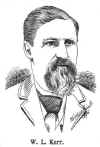nominee. He was the nominee of the democrats and greenbackers for the legislature in 1886, but was defeated by D. B. Kuney.
He was chairman of the populist delegation from this county to the state convention at Wichita in 1892 and voted for Lewelling for governor.
Major Warner was a republican until Peter Cooper became a candidate for president on the greenback ticket in 1876, since that time he has been a third party man.
He was married in November, 1842, to Elisabeth Hall.
When in the legislature Warner voted for Thomas R. Bayne for United States senator, who was a fellow member of the house at the time from Jefferson county and a republican; Bayne himself voting for John A. Martin.
Major Warner's two children had preceded him to this country. John, his son, was postmaster at Almena during Cleveland's first term [1885-1889], and now resides near Almena on a farm.
His daughter is the wife of Eugene S. Payne, who ran a harness shop in this city in former years.
 Walter L. Kerr was born at Poland, Ohio, February 17, 1848. He was the fourth son of Rev. Joseph and Mary S. Caldwell Kerr.
Came to Jefferson county, Iowa, with his parents when six years of age; received a common school education and attended the Fairfield University; he learned the blacksmith trade; came west and after living for a short time in the territories settled in Nemaha county, Kansas, in 1874, but only lived there a few years; he then moved to Marshall county and from there to Jewell county.
He was in the mercantile and blacksmithing business there. He came to Norton county in 1884, homesteading the northeast quarter of section 9, township 4, range 23, seven miles south and one west of Norton, and has resided there ever since.
He was married at Scranton, Osage county, Kansas, November 3, 1878, to Maggie Brown, formerly of Nemaha county.
Five children have been born to them, two boys and three girls, all living.
Mr. Kerr was a republican until 1890, has since been a populist. He was elected to the legislature in 1892, defeating Rev. Vance, the republican nominee.
When the legislative troubles came on he affiliated with the Dunsmore house, but came into the legal house of representatives and reognized (sic) with Speaker Douglass after the famous supreme court decision, known as the Gunn case.
This decision was to the effect that the Dunsmore house had no standing in law.
While we think Mr. Kerr's course while a member of the legislature was clearly wrong, yet it appears to meet the approval of his party.
In the senatorial election of 1893 he cast his vote for John Martin.
Walter L. Kerr was born at Poland, Ohio, February 17, 1848. He was the fourth son of Rev. Joseph and Mary S. Caldwell Kerr.
Came to Jefferson county, Iowa, with his parents when six years of age; received a common school education and attended the Fairfield University; he learned the blacksmith trade; came west and after living for a short time in the territories settled in Nemaha county, Kansas, in 1874, but only lived there a few years; he then moved to Marshall county and from there to Jewell county.
He was in the mercantile and blacksmithing business there. He came to Norton county in 1884, homesteading the northeast quarter of section 9, township 4, range 23, seven miles south and one west of Norton, and has resided there ever since.
He was married at Scranton, Osage county, Kansas, November 3, 1878, to Maggie Brown, formerly of Nemaha county.
Five children have been born to them, two boys and three girls, all living.
Mr. Kerr was a republican until 1890, has since been a populist. He was elected to the legislature in 1892, defeating Rev. Vance, the republican nominee.
When the legislative troubles came on he affiliated with the Dunsmore house, but came into the legal house of representatives and reognized (sic) with Speaker Douglass after the famous supreme court decision, known as the Gunn case.
This decision was to the effect that the Dunsmore house had no standing in law.
While we think Mr. Kerr's course while a member of the legislature was clearly wrong, yet it appears to meet the approval of his party.
In the senatorial election of 1893 he cast his vote for John Martin.
William Schooley Gray was born in Monroe county, Ohio, June 10, 1828. He was the oldest child of a family of nine children.
His parents settled in
|